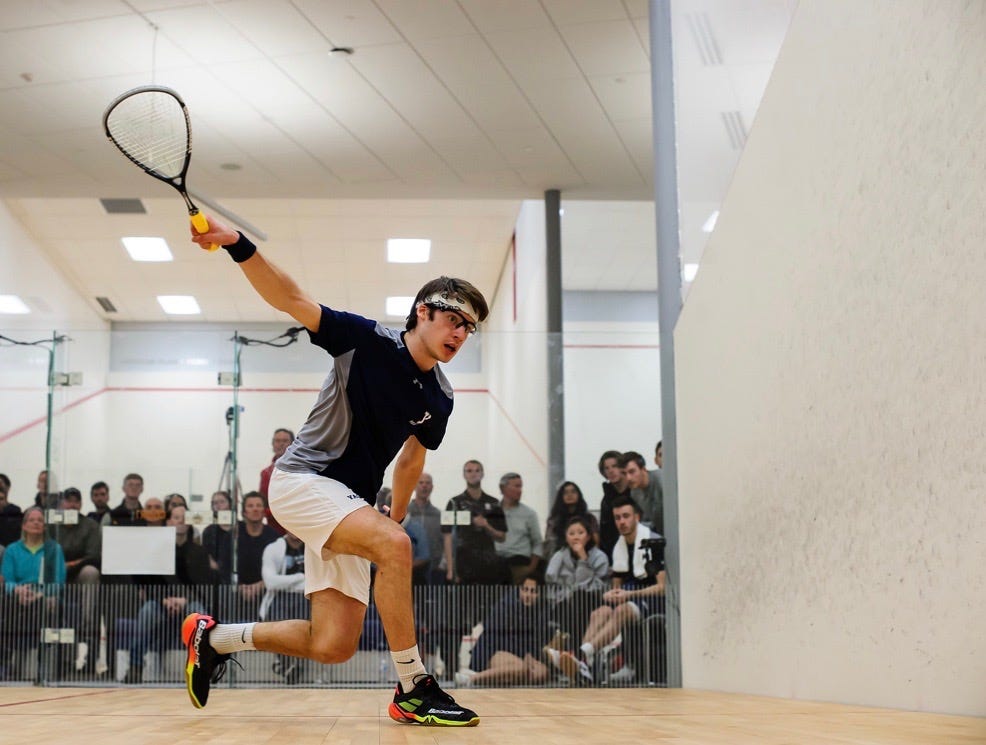From Club Courts to Pro Courts
A sport rooted in clubs brings world class results
A club’s squash courts has often served as the porte d’entrée for many players who reached elite performance, such as the Professional Squash Association or National Squash League.
“I first started playing at the [New Haven] Lawn Club with my dad,” Spencer Lovejoy, the newly-appointed CEO of the National Squash League, told me. “My dad might say differently, but it was a rainy day. I had always played tennis growing up and I was decent at tennis.”
The New Haven Lawn Club, where Lovejoy first played, produced countless legends in squash world, such as all-American squash player T.J. Dembinski and the 2019 British Open Masters’ winner John Musto. Lovejoy, Dembinski, and Musto all not only learned to play at the New Haven Lawn Club reaching the top of the junior game. Each was also a captain of the Yale’s Men’s Squash Team.
Musto, Yale ‘91, recently won at the World Squash Federation’s World Masters in Amsterdam, coming third in the men over 55 category. After stints at Citibank and American Express, Musto transitioned to playing squash professionally.
A former president of the Yale Club, Musto spent a decade on the Club’s board while also working as the squash pro and director of athletics at the now-defunct Princeton Club. He was also the varsity girls’ coach for the Chapin School, situated on Manhattan’s Upper East Side.
“I went with him to the club, and we started hitting the ball around, and I immediately loved it from the first time playing”, Lovejoy remembers. “I would go back with my dad a couple of times a week”. Once he had some idea of what the basics entailed, Lovejoy began taking lessons with the then-Lawn Club squash pro, Bill Ramsey, who was legendary long-time Princeton squash coach Gail Ramsey’s brother.
Lynn Leong’s arrival at the Lawn Club, however, changed things for Lovejoy. Leong, now the coach at Yale, became Lovejoy’s squash mentor for his junior career. “When she first came, I got on court with her for a lesson, and she was really complimentary of my potential, and she really thought I could be a good player if I stuck to it and stayed disciplined”, Lovejoy recounts. “She saw I had good racquet skills. I had a passion for the game, and she really helped me foster the passion that I had, and taught me a lot of things that she knew from playing.”
It certainly helped that Leong’s own career was distinguished. “Leong was a great player when she was in the juniors—she was a top-ranked junior player in the world,” Lovejoy reminds me. “She was #2 behind Nicol David, who is one of the best women’s players of all time, and then she was a top player at Trinity College, and then she came to New Haven from Trinity a few years after she graduated. She took me under her wing and we started to work really hard and try to help me get better.”
From there, Lovejoy’s career was turbocharged. “I was 8 years old when I first started with my dad, but I probably didn’t play my first tournament until I was 10. … From there I was hooked, and I wanted to keep playing and keep developing my game. I played through the whole junior circuit until I was in college.”
Lovejoy represented Team USA on numerous occasions, including twice at the World Junior Championships and the British Junior Open.
Lovejoy is one in a long tradition of people who learnt how to play at his club and then made his way to the pro tour. James Zug, author of an exemplary history of squash, writes in his prologue of squash champions: “They pushed the game to its highest level of excellence. They represented their club, their city, and sometimes their country”. The nature of squash is such that to-day it is a club sport—most Americans who encounter the sport pick it up at the club they belong to, and, as they move through the country and through the course of their lives, join different clubs and play until their bodies give up.
Today, Lovejoy belongs to The Racquet Club of Philadelphia, PA.
“I’m still a member of the Racket Club”, Lovejoy observes, and following his retirement from the pro squash tour, “I probably will use it more now that I’m not playing full-time, just because I do enjoy that social aspect of squash and going for a few beers after you play.
He gives some advice that many of us in Clubland will surely appreciate: “Go break a sweat, burn a few calories, and drink it right back!”

